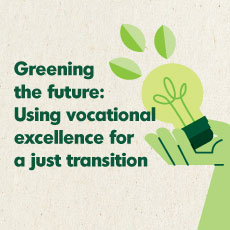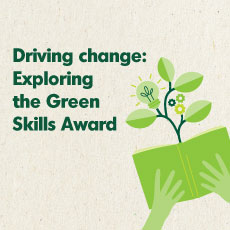
Green Skills, Red Alert!
Learning to power the green transition
Today’s discussions on sustainable development universally acknowledge the desperate need for a transition towards greener societies. So do international agreements, such as the Paris Agreement and the UN Sustainable Development Goals.
To manage the changes called for, we need skilled people.
This collection of articles looks at the interplay of the green transition and skills, revealing how vocational education and training are crucial not only for environmental sustainability but also for making the green transition inclusive and equitable.
? The first article – Green horizons: Skills for climate action – firmly establishes that climate action is an imperative rather than an option and that education and labour reforms are cornerstones in the ecological metamorphosis because it needs a workforce skilled in green technologies and sustainability practices. The chapter describes the grave challenges of the green transition and shows that quite a few of these are even graver in countries neighbouring the EU, but it also offers plenty of hope for these countries if they can mount a strong response. After all, they have some powerful resources, such as young populations and green energy potential.
? The second article – The future of work in the green transition: Evidence from ETF research in countries neighbouring the EU – outlines the challenges and opportunities that the green transition brings to the global job market. It stresses the need for an education system that not only meets but also foresees the skills needed in a greener economy. The idea is simple: a successful green transition relies on a workforce that is skilled, diverse, and able to keep up with the demands of sustainability. But what skills do we need and how can we develop them? Experience gained through recent ETF work on the future of skills sheds some light on the changes to come and how we can prepare for them. Spoiler alert: the green transition demands a complete rethinking of education and training systems.
? The third article – Greening the future: Using vocational excellence for a just transition – delves deeper into the specifics of how excellence in vocational education and training (VET) can be leveraged to ensure that the green transition is equitable. Drawing heavily on the experience of the ETF’s global green VET partnership GRETA (Greening Responses to Excellence through Thematic Actions), it discusses innovation and strategic partnerships that have proven effective in various regions. It highlights the transformative potential of grassroots initiatives when scaled through policy support and supported by educational frameworks. The highlighted stories, from around the world, show that the challenges and solutions are remarkably universal.
? The fourth article – Driving change: Exploring the Green Skills Award – continues this parade of international good practice with some incredibly inspiring examples of change from the ETF’s Green Skills Awards. It celebrates the most innovative and outstanding grassroots initiatives in environmental education and sustainable skills development from around the world. These showcase an abundance of excellent ideas in many fields, including renewable energy, education, the circular economy and governmental policy, to name but a few. The winners represent the absolute best practice in green skills development worldwide.
The authors of the main articles are ETF experts. They have invited colleagues from outside the ETF to contribute to the collection with first-hand experience from their own very colourful patchwork of work environments, ranging from the GIZ to the OECD and from North Macedonia to the US.
Each in their own way, these articles point out why and how we must update our educational methods to teach competences that support the green transition. They call for a profound change to training programmes to include green skills, which are now essential in all parts of the economy and to ensure that no one will be left behind.
The authors recognise the substantial contributions of regions like Eastern Europe, the Middle East, Central Asia and North Africa, which, despite their often-minimal contributions to historical greenhouse gas emissions, face significant impact from climate change. The discussions underscore the importance of equipping these regions with the necessary skills and training to adapt and thrive in a changing environmental landscape.
Laying out these arguments, this collection of articles calls on policymakers, educators and employers everywhere to rethink how we prepare our current and future workers for a sustainable future. The main message is clear:
The green transition will only succeed if it includes everyone, and vocational education is a crucial way to make this happen.
As we move forward, we hope that this can serve as a guide and as a motivation for everyone involved in building a fair and sustainable future. The challenge is substantial, but the pathways are clear and the time to act is now.
All articles © European Training Foundation, 2024
Reproduction is authorised provided the source in acknowledged.



